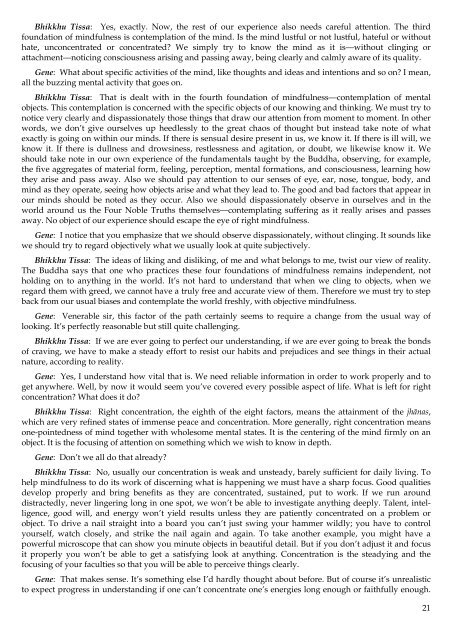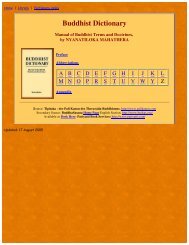Night and Morning with Bhikkhu Tissa
Night and Morning with Bhikkhu Tissa
Night and Morning with Bhikkhu Tissa
- No tags were found...
You also want an ePaper? Increase the reach of your titles
YUMPU automatically turns print PDFs into web optimized ePapers that Google loves.
<strong>Bhikkhu</strong> <strong>Tissa</strong>: Yes, exactly. Now, the rest of our experience also needs careful attention. The thirdfoundation of mindfulness is contemplation of the mind. Is the mind lustful or not lustful, hateful or <strong>with</strong>outhate, unconcentrated or concentrated? We simply try to know the mind as it is—<strong>with</strong>out clinging orattachment—noticing consciousness arising <strong>and</strong> passing away, being clearly <strong>and</strong> calmly aware of its quality.Gene: What about specific activities of the mind, like thoughts <strong>and</strong> ideas <strong>and</strong> intentions <strong>and</strong> so on? I mean,all the buzzing mental activity that goes on.<strong>Bhikkhu</strong> <strong>Tissa</strong>: That is dealt <strong>with</strong> in the fourth foundation of mindfulness—contemplation of mentalobjects. This contemplation is concerned <strong>with</strong> the specific objects of our knowing <strong>and</strong> thinking. We must try tonotice very clearly <strong>and</strong> dispassionately those things that draw our attention from moment to moment. In otherwords, we don’t give ourselves up heedlessly to the great chaos of thought but instead take note of whatexactly is going on <strong>with</strong>in our minds. If there is sensual desire present in us, we know it. If there is ill will, weknow it. If there is dullness <strong>and</strong> drowsiness, restlessness <strong>and</strong> agitation, or doubt, we likewise know it. Weshould take note in our own experience of the fundamentals taught by the Buddha, observing, for example,the five aggregates of material form, feeling, perception, mental formations, <strong>and</strong> consciousness, learning howthey arise <strong>and</strong> pass away. Also we should pay attention to our senses of eye, ear, nose, tongue, body, <strong>and</strong>mind as they operate, seeing how objects arise <strong>and</strong> what they lead to. The good <strong>and</strong> bad factors that appear inour minds should be noted as they occur. Also we should dispassionately observe in ourselves <strong>and</strong> in theworld around us the Four Noble Truths themselves—contemplating suffering as it really arises <strong>and</strong> passesaway. No object of our experience should escape the eye of right mindfulness.Gene: I notice that you emphasize that we should observe dispassionately, <strong>with</strong>out clinging. It sounds likewe should try to regard objectively what we usually look at quite subjectively.<strong>Bhikkhu</strong> <strong>Tissa</strong>: The ideas of liking <strong>and</strong> disliking, of me <strong>and</strong> what belongs to me, twist our view of reality.The Buddha says that one who practices these four foundations of mindfulness remains independent, notholding on to anything in the world. It’s not hard to underst<strong>and</strong> that when we cling to objects, when weregard them <strong>with</strong> greed, we cannot have a truly free <strong>and</strong> accurate view of them. Therefore we must try to stepback from our usual biases <strong>and</strong> contemplate the world freshly, <strong>with</strong> objective mindfulness.Gene: Venerable sir, this factor of the path certainly seems to require a change from the usual way oflooking. It’s perfectly reasonable but still quite challenging.<strong>Bhikkhu</strong> <strong>Tissa</strong>: If we are ever going to perfect our underst<strong>and</strong>ing, if we are ever going to break the bondsof craving, we have to make a steady effort to resist our habits <strong>and</strong> prejudices <strong>and</strong> see things in their actualnature, according to reality.Gene: Yes, I underst<strong>and</strong> how vital that is. We need reliable information in order to work properly <strong>and</strong> toget anywhere. Well, by now it would seem you’ve covered every possible aspect of life. What is left for rightconcentration? What does it do?<strong>Bhikkhu</strong> <strong>Tissa</strong>: Right concentration, the eighth of the eight factors, means the attainment of the jhánas,which are very refined states of immense peace <strong>and</strong> concentration. More generally, right concentration meansone-pointedness of mind together <strong>with</strong> wholesome mental states. It is the centering of the mind firmly on anobject. It is the focusing of attention on something which we wish to know in depth.Gene: Don’t we all do that already?<strong>Bhikkhu</strong> <strong>Tissa</strong>: No, usually our concentration is weak <strong>and</strong> unsteady, barely sufficient for daily living. Tohelp mindfulness to do its work of discerning what is happening we must have a sharp focus. Good qualitiesdevelop properly <strong>and</strong> bring benefits as they are concentrated, sustained, put to work. If we run arounddistractedly, never lingering long in one spot, we won’t be able to investigate anything deeply. Talent, intelligence,good will, <strong>and</strong> energy won’t yield results unless they are patiently concentrated on a problem orobject. To drive a nail straight into a board you can’t just swing your hammer wildly; you have to controlyourself, watch closely, <strong>and</strong> strike the nail again <strong>and</strong> again. To take another example, you might have apowerful microscope that can show you minute objects in beautiful detail. But if you don’t adjust it <strong>and</strong> focusit properly you won’t be able to get a satisfying look at anything. Concentration is the steadying <strong>and</strong> thefocusing of your faculties so that you will be able to perceive things clearly.Gene: That makes sense. It’s something else I’d hardly thought about before. But of course it’s unrealisticto expect progress in underst<strong>and</strong>ing if one can’t concentrate one’s energies long enough or faithfully enough.21
















